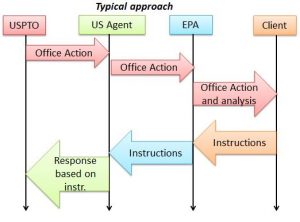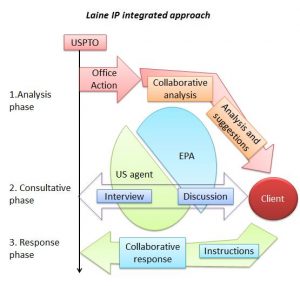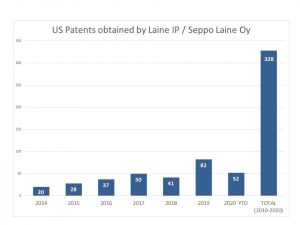-
Services
-
We are happy to announce the launching of our webpages in Swedish. Please check the pages for useful information not only on our company but also on IP rights, based a series of articles prepared by our experts.
Swedish is a national language in Finland, and our office files and prosecutes on a regular basis patent and trade mark applications in Finnish, English and Swedish before the Finnish Patent Office and the EU Trade Marks Office. We also represent our clients directly before the Swedish patent office.
As a Nordic patent agency we are further able to provide service to our European and oversears clients in all Nordic countries through our extensive network of associates.
Should you have any questions regarding our Nordic services, please contact us.
Our aim at Laine IP Oy Legal services is to act in a timely manner and even proactively to provide the best service options to our clients. Our legal team actively serves its clients in IPR -related contract matters (in Finnish and in English), the most common of which are licensing agreements, cooperation agreements, non-disclosure agreements, and distribution agreements, as well as ownership and transfer agreements relating to inventions, patents, designs and trademarks.
In addition, our legal services cover a wide range of dispute resolution services, such as conciliation negotiations, supervision services and legal assistance, especially in the Market court.
Laine IP Oy’s lawyers are experts specialising in IP law, Reijo Kokko and Jemina Koskela are licensed legal counsels. In addition, IPR lawyers Tom-Erik Hagelberg, Mark Scott (US legal matters) and Chris Devine (having completed legal studies in English law) serve clients in various legal matters.
In particular, we handle disputes related to trademarks and design registrations, and we act as background support for our clients and their agents in patent dispute related matters.
Do not hesitate to contact us for assistance in your upcoming IP legal matters. We will be delighted to provide you with further information and provide the legal services you need.
Reijo, Jemina, Tom-Erik, Mark and Chris
No need this year to gather travel documents and travel for a minimum of 15 hours from Helsinki across five time zones to Hangzhou in China. The reasons for not doing this are of course terrible and although it is great to travel to new places and meet colleagues from around the world there are a number of benefits, not least the above-mentioned 15hours and five time zones. AIPPI World Congress 2020 has been held entirely online and for members of AIPPI, free of charge.
This year instead of being spread over a relatively short three or four days, AIPPI World Congress 2020 started on 5th October and ended on 14th October. The reason for this is, no doubt, time zones.
A typical day started at 12:30 with two panel session running in parallel until 2:00 pm, followed immediately by two roundtable session running in parallel from 2:00 pm until 3:00pm, a plenary session from 3:00 to 5:00 pm and second brace of roundtable sessions between 5:00 and 6:00 pm followed ultimately by a doublet of panel session starting at 6:00 and ending at 7:30 pm. Overlapping sessions were poles apart content wise reducing the likelihood that a delegate might need to be in two virtual rooms at once.
As you can see, being in Europe is a blessing timetable wise. For those colleagues in Sao Paolo, an early session would have started at 6:30 am, while for those in Hangzhou, a late session would have finished at 12:30 am. Neither of these times are impossible for those panelists who are scattered around the world or for those congress delegates who desperately want to participate in Q&A at a panel session.
Delegates who couldn’t get out of bed, couldn’t wait to get to bed or felt the need to be in two places at once were also catered for. All of the panel sessions have been recorded and will be available for delegates to view until 15th November through the AIPPI World Congress portal.
In addition to panel sessions, roundtables and plenary sessions there is traditionally the opportunity for one-to-one meetings with colleagues past, present and future to discuss cooperation between firms across continents. These opportunities were also available in the online arena. There was a lounge area for making initial contact after which parties could agree (or decline) a meeting.
One aspect of an online conference that is impossible to replicate is of course the social events in the evenings in which even IP professionals can loosen up and talk non IP-related trivia to others who are just as interested in not talking about IP.
So is the online conference the new normal? In the short term it is and simply because in addition to the threat of Covid 19 it makes economic sense. Flight costs, hotel costs, daily allowance costs are all reduced to zero. In addition to attending sessions, delegates are able to work fulltime efficiently from wherever it is that they choose to work these days. Long term it is more difficult to guess, but if organisations such as AIPPI decide that sessions will be made available online at either no cost or at a greatly reduced cost, conferences could become a thing of the past. This of course is not what we wish or hope for. Despite the cost and jet lag-related benefits, no man is an island. It is a pleasure to meet and discuss with colleagues from around the world and it is a pleasure to visit new and interesting places. I hope to be able to meet colleagues in person and explore Hangzhou in October next year at AIPPI World congress 2021.
Business Essentials for Scientists (BES) (2 ECTS) is a course aimed at doctoral students at University of Turku and Åbo Akademi University. After the course the doctoral student has a basic understanding of business development and commercialisation in the academia.
Our expert, European Patent Attorney, Christoffer Sundman, will talk about “Protecting your invention” on October 15, 2020.
Laine IP Oy (Laine IP) has had an internal U.S. Team, located in Helsinki, to handle U.S. patent and trademark prosecution since 2010. The close collaboration of the U.S. Team with our other experts is a key component in securing the strongest global Intellectual Property (IP) rights for our clients.
A recent sequence of events in a U.S. patent application illustrates the benefit of such collaboration between members of Laine IP in handling a U.S. IPR matter for a Finnish company:
Traditional models between U.S. practitioners (agents) and European Patent Attorneys (EPA) do not fully utilize collaboration. Such a process for responding to a U.S. Office Action involving a client, an EPA, and a U.S. agent is shown below:

In contrast, Laine IP’s EPA/U.S. agent approach with its internal team can be illustrated as follows:

As can be seen, the Laine IP approach utilizes, depending on the case, significantly greater collaboration between the parties and promotes more efficient prosecution with potentially broader patent protection in line with the client’s specific business goals. Additionally, Laine IP’s clients can easily discuss their cases directly with our internal U.S. practitioners located in Helsinki – either in a face-to-face meeting or over the phone in the same time zone.
To date, this collaborative approach has resulted in three hundred twenty eight (328) U.S. patents since the inception of the U.S. team in 2010. The below graph illustrated the number of U.S. Patents obtained by Laine IP on behalf of its clients over the past 7 years and total from 2010-present. Note: Laine IP was previously named Seppo Laine Oy.

In summary, the above positive results were achieved by the strong collaboration between Laine IP’s European counsel (EPA), U.S. practitioners, clients, and the U.S. Patent Office. The client’s active and exemplary involvement in the patent prosecution process also allows the U.S. patent prosecution process to be completed more efficiently and in line with the client’s IPR goals. Further, the combined expertise of both the European and U.S. practitioners and full access to the relevant information, including corresponding foreign applications and internal notes, has allowed Laine IP to effectively obtain the protection desired by the client in the U.S. market. Laine IP is constantly improving its processes so that our clients receive the benefits of collaboration between its European and U.S. practitioners.
We thank our clients for entrusting their IP to our care and are happy to answer any questions you might have, including discussing how we may increase the effectiveness of your U.S. prosecution at usdesk@laineip.fi
Since 2011, prioritized examination has been available for U.S. patent applications via the Track One pilot program. Now, the newly announced Fast-Track Appeals program provides the opportunity to request prioritized examination of Appeals as well. We introduce both programs below and provide some insights as how they might be used.
The Track One prioritized examination means that the USPTO will aim to provide a Final Office Action (commonly a second technical office action) in less than a year. Consequently, the examination process is started much faster than normal, as the average time to the first Office Action is around 14 months. This is meaningful as any information within Office Actions obtained within the priority year may be used when considering any corresponding patent filings in other countries.
The Track One program requires a substantial fee (4000 USD for large entities), which may reduce its attractiveness with cost-sensitive applicants. The USPTO discount policy applies to the Track One fee as well, which means that small and micro entities may request Track One for 2000 USD and 1000 USD, respectively. Track One is available for most types of patent applications with certain restrictions, but reissue applications are excluded from the program.
In situations where the applicant and the Examiner disagree regarding the patentability of the application, the first instance of appeal is the USPTO’s Patent and Trial Appeal Board (PTAB). Depending on the situation, the appeal process may require extensive work from the U.S. patent agent to ensure that the Appeal Brief properly lays out the facts of the case along with the arguments for patentability and any relevant case law. Another factor which affects the decision to file an appeal is the relatively long time it takes for the USPTO to handle appeals, as the average time to decision is 14 months. The appeal process may thus “freeze” the patent process for some time.
The USPTO has now announced a new Fast Track Appeal pilot program, which allows requesting expedited processing for appeals for a moderate fee (400 USD, no fee reductions). When expedited processing is requested, the PTAB will endeavor to reach a decision within 6 months of the request. The Track One programs and the Fast Track Appeal programs are separate entities. Thus, requesting Track One expedited prosecution of a patent application will not result in expedited processing of an appeal in that application. Nor will requesting Fast Track Appeal expedite the prosecution of the patent application being appealed. During the next year, the USPTO will accept only 500 Fast Track Appeal requests, and the program will terminate in summer 2021. The USPTO has generally continued expired pilot programs with minor changes, so it may be that expedited processing for appeals is here to stay.
USPTO Fast Track Appeal announcement
The Fast Track Appeal pilot program continues the USPTO policy of providing faster processing in return for a fee. While the Track One program speeds up the early stages of the patent application process for a substantial fee, the Fast Track Appeal program is aimed at allowing applicants to obtain a decision on appeal quickly. The expedited appeal process along with the moderate official fee will most likely result in more situations where an appeal is the best way to proceed. However, the appeal process is still costly for applicants and the pilot program does not reduce the costs of appealing. As every patent application is different, expert advice should be taken when considering the use of either of these pilot programs.
Disclaimer: This post is provided for educational purposes only and does not constitute legal guidance.
Laine IP has again been recognized with the highest ranking in its category as a Tier 1 Patent Prosecution firm in Finland, and also has been recognized as a Recommended Trade Mark Prosecution firm in Finland.
These achievements have been made possible by our experts and collaboration with our dedicated clients and foreign partners. We thank both our clients and partners for their trust and feedback.
For more than 20 years, the prestigious Managing IP publication in the IPR industry has assessed the quality of work and customer satisfaction of patent and trademark attorneys through its annual survey. The IP STARS ranking is based on extensive interviews and surveys of IPR professionals and clients covering more than 80 countries. It has become one of the most respected and well-known indicators in the IPR field.
“Vatsaystävällinen Pehmeä” is a bread baked with the enzyme developed and patented by Fazer as a result of a long-term development work. This enzyme breaks down the fructan in wheat and rye during the baking process, thus reducing the amount of compounds that can cause digestion-related symptoms to people with sensitive stomach – without affecting the taste or texture of bread.

The non-alcoholic hand foam developed by the Finnish Nolla Antimicrobial is effective against enveloped viruses, such as coronaviruses. The case was confirmed by studies at the BluTest laboratory in Scotland.
Read more on Nolla Antimicrobial’s website

Fennia Prize is one of Finland’s most prominent design competitions. It is arranged by Design Forum Finland, Fennia Group, Elo and the Finnish Patent and Registration Office.
Our warmest congratulations!